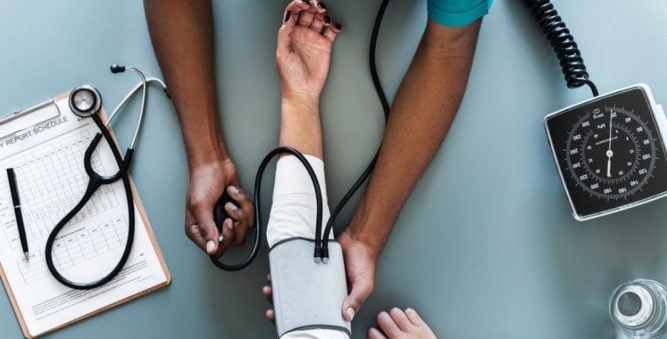If your heart pumps faster as your blood pushes forcefully into your arteries, you are experiencing high blood pressure, medically referred to as “hypertension”. What makes it more dangerous is that many people who suffer it, do not even realize that they have hypertension.
Hypertension is classified into different types based on various factors, and each of these types has different causes and treatment options. In this article, we will provide you with more information on the different types of hypertension, how they are similar to and different from each other.
Types of hypertension
Hypertension is principally classified into two types – primary hypertension and secondary hypertension.
Primary Vs Secondary hypertension
Often the reason for high blood pressure is never known, which is when it is classified as primary hypertension, which also known as “Essential hypertension”.
The secondary hypertension is when your doctor identifies the cause for the high blood pressure.
Let us look at these two types more in detail.
Primary or Essential hypertension
The primary factors for hypertension, especially in primary hypertension, lie within your genetics, lifestyle and your diet.
By definition, primary hypertension has no causative factor; however, research indicates a strong connection between salt in your diet and high blood pressure. It has been found that people with hypertension generally suffer from it when the body ingests more salt than required. But consuming salty diet is not the only possible reason for primary hypertension either.
There are also other risk factors which can result in high blood pressure like diabetes, obesity, stress, the absence of physical activities, chronic alcoholism, deficiency in magnesium, potassium and calcium, etc.
While there may be so many hidden factors, 95% of those who suffer from hypertension do not know the exact cause for their illness, and that is when it is classified as essential or primary hypertension.
Secondary hypertension
As mentioned earlier, when you know the cause for the peak in your blood pressure, you have secondary hypertension.
There are various causes associated with secondary hypertension, and it varies with age. Pre-existing medical conditions that have an impact on your arteries, heart, kidneys or the endocrine system can result in secondary hypertension. Sometimes pregnancy can also cause secondary hypertension.
Even with secondary hypertension, many do not realize that they are suffering from it, even after it goes very high.
Some of the known causes for secondary hypertension include,
- Complications from diabetes where the kidney gets affected resulting in high blood pressure.
- Kidney affected due to cysts in it, which causes a spike in blood pressure.
- When the glomeruli in the kidneys that filter the waste from our blood, is swollen, the kidneys cannot function properly resulting in high blood pressure.
- When the artery leading to the kidneys called is narrowed (known as “stenosis”), it can affect the blood flow resulting in hypertension.
- When cortisol is produced in excess, owing to different causes like a pituitary tumour.
- Increase in aldosterone in the adrenal gland, owing to reasons like a tumour or other factors.
- Thyroid issues, excessive or reduced secretion of thyroid hormones.
- When aorta, the main artery in our body, is narrow (mostly by birth), it can lead to hypertension.
- Obesity and pregnancy
- Lack of sufficient sleep, or sleep apnea
- Intake of medicines like pain killers, antidepressants, and other drugs.
Depending on the underlying medical condition causing secondary hypertension, it can result in more complications including aneurysm, heart failure, vision loss, kidney damage, etc.
Resistant vs Malignant hypertension
Resistant Hypertension
When your blood pressure continues to remain high, despite the use of 3 antihypertensive agents or more (including a diuretic), at the maximum permitted dosages, then you have resistant hypertension.
In simple words, when your blood pressure is resistant to medications, then you have resistant hypertension with an underlying medical condition. Major causes for resistant hypertension include,
- Hormones controlling the blood pressure are not balanced.
- Renal artery stenosis where there are plaques in the blood vessels leading to the kidneys.
- Sleep apnea which results in lack of proper sleep due to obstruction in the respiratory path.
- Heavy consumption of alcohol and other drugs.
- Obesity.
- Old age.
The last two factors are considered to have more influence on the condition.
While the prognosis is unknown for resistant hypertension, people who have resistant hypertension have higher chances of cardiovascular complications in comparison to those with other forms of hypertension.
Malignant Hypertension – it is a medical emergency!
When the blood pressure keeps climbing up and results in damage to the body organs, it is considered as malignant hypertension. Various organs including our eyes, heart, kidneys, blood vessels and brain are at risk in this scenario.
Immediate care is required to prevent any permanent damage like vision loss or kidney failure. Most of the times, it is the inadequate monitoring and management of blood pressure that causes this prognosis.
The primary causes for malignant hypertension include,
- Rebound effect when you miss out on your blood pressure medications.
- Narrowing of arteries or renal artery stenosis.
- Dissection or narrowing of the aorta, the main artery.
- Disorders in the spinal cord.
- Eclampsia and preeclampsia during pregnancy.
- Pre-existing conditions of Collagen vascular diseases.
- Failure or disorder in kidneys in the past.
- Certain medications including oral contraceptives, amphetamines, cocaine, etc.
This type of hypertension is found more common among smokers, people of age above 50 years, people who have blood pressure higher or equal to 140/90.
Pulmonary Vs Systemic hypertension
Before we understand the pulmonary and systemic hypertension, let us find out how the blood flow works in our body.
The blood flows through the small blood vessels and arteries from the right side of our heart to the lungs, which adds the oxygen to the blood before it is pumped to the other parts of our body from the left side of our heart.
Pulmonary hypertension
When the blood vessels through which the blood flows to lungs narrow down or is blocked, the heart has to work overtime to pump blood, with the right side of it swelling as it pumps harder. Inevitably the blood pressure increases in our lungs. This condition where the lungs have an elevated blood pressure is referred to as “pulmonary
hypertension”.
In the same scenario, if the arteries or the blood vessels that carry the blood to the lungs experience elevated blood pressure, it is termed as “Pulmonary Arterial Hypertension (PAH)”. When there is pulmonary hypertension, there are more chances of a Pulmonary Arterial Hypertension too. However, the occurrence of PAH is always isolated and may not result in pulmonary hypertension.
The major cause of Pulmonary hypertension is the lack of oxygen in blood for a prolonged period. Other reasons include,
- Lung diseases like pulmonary fibrosis
- Congestive heart failure
- HIV infection
- Consumption of diet drugs
- Obstructive sleep apnea
Systemic hypertension
When the systolic increases above 160mm Hg or the diastolic increases above 100 mm Hg in the systemic arterial pressure, then it is referred to as systemic hypertension.
To put in simple words and in relation to pulmonary hypertension, when the blood pressure in the smaller arteries that carry the blood to other organs, other than lungs, increases, it is termed as systemic hypertension.
Studies show that patients who have systemic hypertension also may have symptoms of pulmonary hypertension. But there is no clear evidence that systemic hypertension can result or cause pulmonary hypertension though.
Systolic vs Diastolic hypertension
As you would be aware, the blood pressure is measured in two levels – the systolic and the diastolic. When we mention hypertension, it is generally an increase in both the levels that we refer to. However, that may not be the case all the time.
Some patients do have an increase in the systolic levels without a corresponding increase in diastolic, or vice versa.
Isolated systolic hypertension
When your systolic blood pressure is higher, >140 mm Hg, but your diastolic levels remain normal at <90 mm Hg, then you have “isolated systolic hypertension”. With higher systolic pressure, there are more chances of a stroke, chronic kidney disease and heart disease and that is probably why it is termed as “the silent killer.” You never know it exists unless your doctor tells you.
The isolated systolic hypertension is more common in the people whose age is above or equal to 65 years of age. The underlying causes for systolic hypertension could be,
- Stiffness of arteries
- Overactive thyroid or hyperthyroidism
- Diabetes
Diastolic hypertension
On the contrary to the isolated systolic hypertension, here the blood pressure is quite normal at the systolic levels, < 140mm Hg, but higher in the diastolic level, >90mm Hg.
Diastolic pressure is the force of blood as it flows through arteries in between heartbeats, or while the heart rests between beats. When the arteries that deliver the blood are narrowed, then it could result in a possible isolated diastolic hypertension.
As far as the causes of isolated diastolic hypertension are concerned, it includes,
- Hypothyroidism or an underactive thyroid
- Excessive narrowing of the smaller arteries or the arterioles
- High levels of hormones like corticosteroids, aldosterone, parathyroid.
- Renovascular stenosis
- Any damage to kidneys.
- Lack of proper sleep or sleep apnea
White coat hypertension
Have you ever had a scenario where the blood pressure, when measured at home, is within the normal range and is contradictory to the result in the hospital? If yes, then you have what is medically referred to as “white coat hypertension”, where the “white coat” refers to the white coat worn by doctors.
It is a well-known fact that our blood pressure keeps changing over the day depending on various factors. White coat hypertension is when you are tensed while the blood pressure is being taken by a doctor, in a hospital setting, which causes a spike in the levels.
It was earlier considered to be okay having white coat hypertension, as your blood pressure returns to normal immediately after leaving the hospital. However, recent studies indicate that you are more prone to high blood pressure or hypertension if you have white coat hypertension. The condition must be monitored to ensure that the blood pressure does not increase and stays normal unless in the hospital conditions.
Pregnancy-related hypertension
Also referred to as “gestational
hypertension”, it is the blood pressure that spikes during the pregnancy period. It is a common condition encountered during pregnancies, and in some cases, it can even lead to complications during delivery. This is further divided into three different categories:
- Gestational hypertension where the blood pressure elevates after about 20 weeks into the pregnancy and ceases after delivery.
- Chronic hypertension where the hypertension was already there before pregnancy or was developed within the first 20 weeks, and continues to remain after delivery.
- Preeclampsia which is a much severe condition resulting from any of the two types above, and can result in complications.
There are no definitive causes on whom, why or what can cause gestational hypertension.
According to studies, women are at more risk of having pregnancy-related hypertension, if
- They are above 40 years of age or below 20 years,
- They are first-time mothers
- They have gestational hypertension in their families. For example, their mothers or sisters had it before.
- Kidney disease prior to pregnancy.
- When they carry more than one baby
Conclusion
As you can now understand, hypertension comes in various forms, and there are different causes for each type. To get the right treatment for your condition, you need to be aware of the kind of hypertension that you have. While there are many causes, simple lifestyle changes can help you win the situation in your favour any day. A stress-free life with proper food and a balanced diet can go a long way in keeping you healthy.
Knowledge is the first step to cure, and your doctor can guide you in the right direction after having thoroughly analyzed your condition.










Thank you for such a valuable source of knowledge on back pain. I live with it everyday from a jumping accident in the service. I have learn to live with it for I don’t like taken a lot of pills. Bad enough I have to take them for my moods and ptsd. My question to you is where would one find the knowledge of what plants and herbs help with back pain. Thank you for such a great website, I have booked marked it so I can go back to it as needed.
Hi Tim,
Thanks for your question and we are glad you find the information useful.
We have covered Natural Remedies For Chronic Back Pain priviously. Just follow the link.
Best wishes.
Hello Shani, Thank you so much for this very educational post on the different types of hypertension. This article was of particular interest to me because I recently learned that I have high blood pressure. I had no idea! I have been a vegetarian for many years, I’m at my ideal weight, and I quit smoking 8 years ago. I just couldn’t understand why!
Then you explained about primary or essential hypertension, and how many people do not know the exact cause. I have an appointment with my Physician in 10 days and reading your article made me feel somewhat relieved, and more informed on the subject so that I know better what to expect. I also had no idea that the kidneys and hormonal imbalances could have such an effect on blood pressure.
Thank you for this exceptional post…I think reading it has lowered my blood pressure!
Sue
Hi Sue,
Thanks for sharing your story about hypertension.
We are glad that you found the information useful.
Before now, I did not know that the concept of hypertension is so broad as you’ve written here. This is quite educating.
Often times I ask; can a person ever lead a stress-free lifestyle when all around us are situations that can trigger anxiety and its attendant hypertension.
How would you consider callousness by health practitioners in breaking news to a patient that they are hypertensive? I never knew I was hypertensive until I went for a tooth surgery. I was gripped with fear of entering the dentist clinic. I was referred to a nurse (carefree one) who brought out the instrument to check my blood pressure. After some minutes, she broke to me that I was hypertensive. My fear triggered even more, at the sound of that word. LOL! She checked me again after a while and told me that my blood pressure was even higher than what she found earlier. I got sad and canceled the appointment. My annoyance was that she was callous in breaking the health news to me which even got my earlier hypertension worse.
How would you prescribe that patients should be briefed when they are diagnosed with any hypertensive disorder?
Dear,
Thanks for sharing your story about hypertension.
Delivering bad news to a patient is one of the most challenging tasks healthcare practitioners encounter. Some general guidelines that Australian practitioners use are in this link http://www.cetl.org.uk/learning/feedback_opportunities/data/downloads/breaking_bad_news.pdf
I hope this helps.
Dear Shani,
Thanks for this article. It has helped me better understand what is hypertension and what are the causes behind it. The health field has always interested me not mainly because my mom is a nurse but that you can never learn enough about it. I am always curious about what health condition can have what symptoms to define the diagnosis.
I do recall the words benign and malignant though. Benign is something better while malignant stands for something bad.
I am one of those people that almost feels overly stressed out in a situation where I am being held back for a long period of time just for the other person to come to a final solution to a problem.
Thank you for highlighting what the difference between diastolic and systolic pressure are. I often get confused between the 2 on which needs to be the higher number or lower number of the other.
I have even taken steps to eat healthier by not eating things that are heavy in salt, in airplanes especially. I drink mostly water, quit drinking coke or other beverage drinks as that can contribute to having diabetes. I have also quit drinking coffee as that is full of caffeine and can keep some people awake for long hours without any rest which leads to sleep apnea or insomnia.
Wishing you all the best with your online success above and beyond the horizon,
~Angel
Dear Angel,
Thanks for your lovely note. I am glad that you found the information useful.
https://youtu.be/Btn01xB-iRU
Your effort to maintain a healthy lifestyle should be applauded.
Keep it up and best wishes.
Hi Angel,
Our video about What is High Blood Pressure? is on YouTube.
Happy watching!
Dear Shani,
This is a nice one, Shani. Thanks for this educative piece. All these while, I have always thought that hypertension is hypertension, not knowing there are many types of hypertension. So, there are about 10 different types of hypertension.
I want to know the relationship between anxiety, depression, and hypertension. Does excessive worry lead to hypertension?
I agree with you that Knowledge is the first step to cure. Thanks for providing the knowledge of the types and causes of hypertension.
Tolu.
Dear Tolu,
Thanks for your comment. I am glad that you found the information useful.
There is no scientific evidence to prove that stress by itself causes long-term high blood pressure. However, some people react to stress, anxiety and depression in unhealthy ways, which can increase their risk for hypertension, heart attacks and strokes.
I hope this helps.
Dear Shani,
Hypertension is regarded as a silent killer because a lot of individuals are hypertensive and are not aware of this. I must commend you for the great article you’ve written, covers every thing hypertension related.
you mentioned that we can control the risk of hypertension by changing our lifestyle and diet. Do you recommend cutting salt totally from our diet? Would this significantly reduce the risk of hypertension?
Thanks again.
Louis
Dear Louis,
Thanks for the question and I am glad that you found the information useful.
You are correct. There is strong evidence to suggest excess salt consumption leads to hypertension. The Australian National Health and Medical Research Council recommends only 20–40 mmol (460–920 mg) of sodium per day, which equates to 1.15–2.3 grams of salt. However, on average, Australians consumes twice the recommended daily salt intake.
I hope this help.
As someone who just hit 50, I’m realizing how very little I know about the health issues I may be facing as I get older, including hypertension. So far this isn’t an issue for me personally but it does run in my family so I will be sure to keep an eye on it. I had no idea that there were so many types! Thank you for your informative article.
Hi Mishi,
Thanks for the comment and we are glad that you found the information useful.
King regards.
Thanks for this very informative article about the types of hypertension
I come from a family in which many of my relatives have surfer from hypertension, my grandmother and some of my aunties.
I have been aware since my childhood that we had this in our genes, so I have always tried to control my diet and lifestyle.
Thanks for this guide on the possible causes of hypertension both primary and secondary, it will really guide my lifestyle now.
Hi Etah,
Thanks for the comment. We are glad that you found the information useful.
Do you know the stage of your blood pressure? Our article on Stages Of Hypertension will help you to understand the answer.
Best wishes.
Really interesting article. I was always under the impression that high blood pressure was simply high blood pressure. I had no idea that there were different types.
I also got a fright when I saw your list on what could cause high blood pressure, as this could potentially affect a lot of people.
Sleep apnea and thyroid conditions were two of the things that I had no idea affected blood pressure.
Hi Michel,
Thanks for the comment.
We are glad that you found the information useful. You may also find our article on Stages Of Hypertension helpful.
Best wishes.
This is an informative and educative article. You have thoroughly put everything in perspective for anyone reading this post to understand the points. This is the most comprehensive article I have ever read on hypertension, I get to discover from your article that I have suffered from primary hypertension. This is an eye-opener for me and I must tell you I learnt a lot.
Thank you for this live changer sensitization.
Hi there,
We are glad that you found the information useful.
Thanks for your comment.